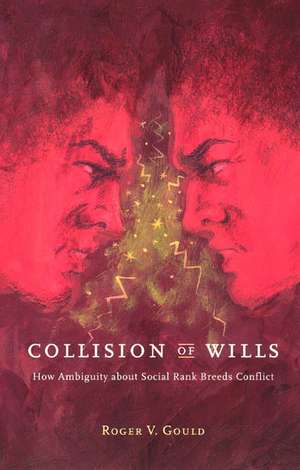Collision of Wills: How Ambiguity about Social Rank Breeds Conflict
Autor Roger V. Goulden Limba Engleză Paperback – 15 sep 2003
Minor debts, derisive remarks, a fight over a parking space, butting in line—these are the little things that nevertheless account for much of the violence in human society. But why? Roger V. Gould considers this intriguing question in Collision of Wills. He argues that human conflict is more likely to occur in symmetrical relationships—among friends or social equals—than in hierarchical ones, wherein the difference of social rank between the two individuals is already established.
This, he maintains, is because violence most often occurs when someone wants to achieve superiority or dominance over someone else, even if there is no substantive reason for doing so. In making the case for this original idea, Gould explores a diverse range of examples, including murders, blood feuds, vendettas, revolutions, and the everyday disagreements that compel people to act violently. The result is an intelligent and provocative work that restores the study of conflict to the center of social inquiry.
This, he maintains, is because violence most often occurs when someone wants to achieve superiority or dominance over someone else, even if there is no substantive reason for doing so. In making the case for this original idea, Gould explores a diverse range of examples, including murders, blood feuds, vendettas, revolutions, and the everyday disagreements that compel people to act violently. The result is an intelligent and provocative work that restores the study of conflict to the center of social inquiry.
Preț: 248.64 lei
Nou
Puncte Express: 373
Preț estimativ în valută:
47.58€ • 51.89$ • 40.12£
47.58€ • 51.89$ • 40.12£
Carte tipărită la comandă
Livrare economică 25 aprilie-09 mai
Preluare comenzi: 021 569.72.76
Specificații
ISBN-13: 9780226305509
ISBN-10: 0226305503
Pagini: 224
Ilustrații: 1 halftone, 1 figure, 17 tables
Dimensiuni: 140 x 216 x 23 mm
Greutate: 0.3 kg
Ediția:First Edition
Editura: University of Chicago Press
Colecția University of Chicago Press
ISBN-10: 0226305503
Pagini: 224
Ilustrații: 1 halftone, 1 figure, 17 tables
Dimensiuni: 140 x 216 x 23 mm
Greutate: 0.3 kg
Ediția:First Edition
Editura: University of Chicago Press
Colecția University of Chicago Press
Notă biografică
Roger V. Gould was a professor of sociology at Yale University and visiting scholar at the Russell Sage Foundation when he died in 2002. He wrote Insurgent Identities and edited The Rational Choice Controversy in Historical Sociology, both published by the University of Chicago Press.
Cuprins
Foreword by Peter Bearman
1. Conflict, Honor, and Hierarchy
2. Dominance Relations
3. Strife out of Symmetry
4. Solidarity and Group Conflict
5. Conflict and Social Structure
6. Honor and the Individual
References
Index
1. Conflict, Honor, and Hierarchy
2. Dominance Relations
3. Strife out of Symmetry
4. Solidarity and Group Conflict
5. Conflict and Social Structure
6. Honor and the Individual
References
Index















